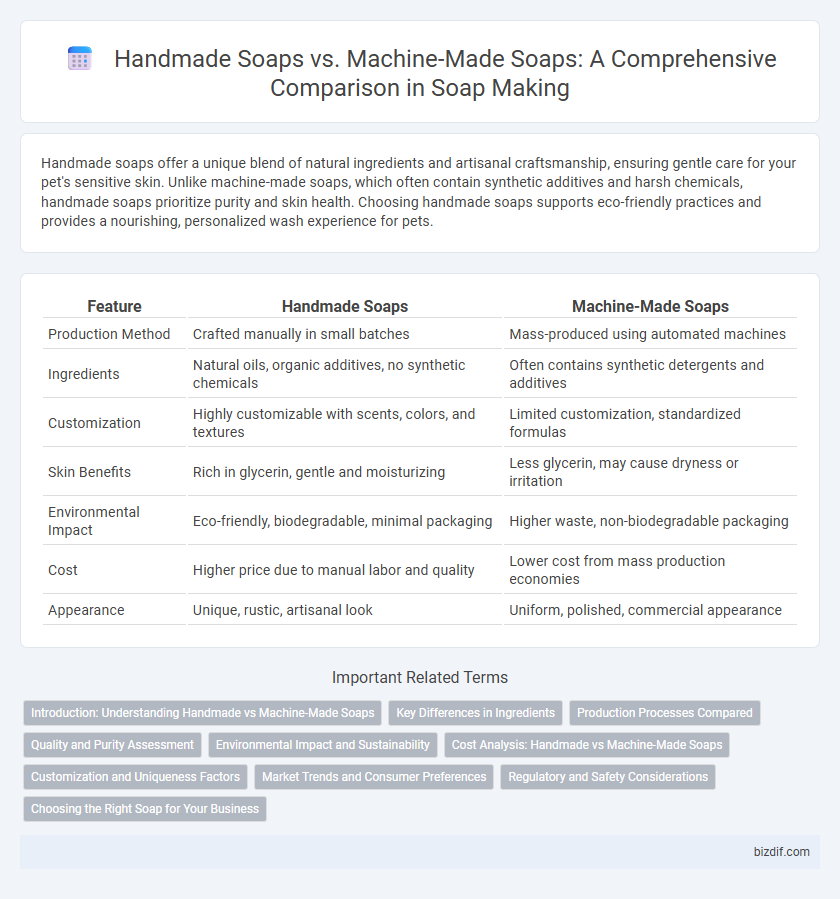Handmade soaps offer a unique blend of natural ingredients and artisanal craftsmanship, ensuring gentle care for your pet's sensitive skin. Unlike machine-made soaps, which often contain synthetic additives and harsh chemicals, handmade soaps prioritize purity and skin health. Choosing handmade soaps supports eco-friendly practices and provides a nourishing, personalized wash experience for pets.
Table of Comparison
| Feature | Handmade Soaps | Machine-Made Soaps |
|---|---|---|
| Production Method | Crafted manually in small batches | Mass-produced using automated machines |
| Ingredients | Natural oils, organic additives, no synthetic chemicals | Often contains synthetic detergents and additives |
| Customization | Highly customizable with scents, colors, and textures | Limited customization, standardized formulas |
| Skin Benefits | Rich in glycerin, gentle and moisturizing | Less glycerin, may cause dryness or irritation |
| Environmental Impact | Eco-friendly, biodegradable, minimal packaging | Higher waste, non-biodegradable packaging |
| Cost | Higher price due to manual labor and quality | Lower cost from mass production economies |
| Appearance | Unique, rustic, artisanal look | Uniform, polished, commercial appearance |
Introduction: Understanding Handmade vs Machine-Made Soaps
Handmade soaps are crafted using traditional methods such as cold process or hot process, allowing for natural ingredients like essential oils and botanical extracts to remain intact, enhancing skin benefits. Machine-made soaps are mass-produced with synthetic additives and uniform shapes, prioritizing efficiency and longer shelf life. Understanding these differences helps consumers choose based on ingredient quality, customization, and skin sensitivity.
Key Differences in Ingredients
Handmade soaps often contain natural oils, butters, essential oils, and botanicals, ensuring a high concentration of glycerin that retains moisture and benefits the skin. Machine-made soaps typically use synthetic detergents, harsh chemicals, and artificial fragrances, which can strip away natural oils and cause dryness. The ingredient transparency in handmade soaps caters to sensitive skin, while machine-made soaps prioritize cost efficiency and longer shelf life through preservatives.
Production Processes Compared
Handmade soaps are crafted through traditional cold or hot process methods, allowing precise control over ingredients and curing times to create unique textures and scents. Machine-made soaps utilize automated production lines with continuous mixing, molding, and rapid curing, enabling high-volume output and consistent product quality. The artisanal approach results in limited batches with natural glycerin retention, while industrial machines prioritize efficiency and uniformity over individuality.
Quality and Purity Assessment
Handmade soaps typically offer superior quality and purity due to their use of natural ingredients and small-batch production methods, which preserve essential oils and glycerin. Machine-made soaps often contain synthetic additives and undergo high-heat processes that can degrade natural components, reducing skin benefits. Quality assessments reveal handmade soaps have higher moisturizing properties and fewer chemical residues, making them a preferred choice for sensitive skin.
Environmental Impact and Sustainability
Handmade soaps typically use natural, biodegradable ingredients and avoid synthetic chemicals, reducing environmental pollution and promoting sustainability. Machine-made soaps often rely on petrochemical surfactants and mass production, generating more industrial waste and higher carbon emissions. Choosing handmade soaps supports eco-friendly practices by minimizing plastic packaging and encouraging small-scale, sustainable craftsmanship.
Cost Analysis: Handmade vs Machine-Made Soaps
Handmade soaps typically incur higher production costs due to labor-intensive processes and premium natural ingredients, resulting in a higher retail price compared to machine-made soaps. Machine-made soaps benefit from economies of scale, automated processes, and bulk raw material purchasing, reducing per-unit costs significantly. Consumers often pay a premium for handmade soaps because of their artisanal quality and customization options, despite the more affordable pricing of mass-produced alternatives.
Customization and Uniqueness Factors
Handmade soaps offer unparalleled customization through the use of natural ingredients, unique scent blends, and tailored skin benefits, setting them apart from machine-made soaps that typically follow standardized formulas. Artisanal soap makers can incorporate specific essential oils, colors, and textures, creating distinct, one-of-a-kind bars that cater to individual preferences and skin types. This level of personalization enhances the uniqueness and appeal of handmade soaps, making them ideal for consumers seeking exclusive and skin-friendly options.
Market Trends and Consumer Preferences
Handmade soaps are experiencing a surge in market demand driven by consumer preference for natural ingredients and artisanal quality, with a growth rate of approximately 12% annually in the niche soap segment. Machine-made soaps dominate mass markets due to their lower price points and standardized production, but face increasing competition from eco-conscious buyers prioritizing sustainability and skin-friendly formulations. Market trends indicate a shift towards handmade soaps as consumers value transparency in sourcing and unique, customizable product features.
Regulatory and Safety Considerations
Handmade soaps are often regulated less stringently than machine-made soaps, with safety relying heavily on artisan knowledge and ingredient quality. Machine-made soaps undergo rigorous quality control and must adhere to strict regulatory standards including ingredient disclosure and microbial testing. Consumers seeking natural formulations should verify compliance with safety certifications to ensure product reliability.
Choosing the Right Soap for Your Business
Handmade soaps offer unique formulations with natural ingredients and artisanal quality, appealing to niche markets that value sustainability and customization. Machine-made soaps provide consistent production volumes and uniform appearance, ideal for scaling businesses targeting mass consumers. Choosing the right soap for your business depends on your target audience, production capacity, and brand positioning within the personal care industry.
Handmade Soaps vs Machine-Made Soaps Infographic

 bizdif.com
bizdif.com